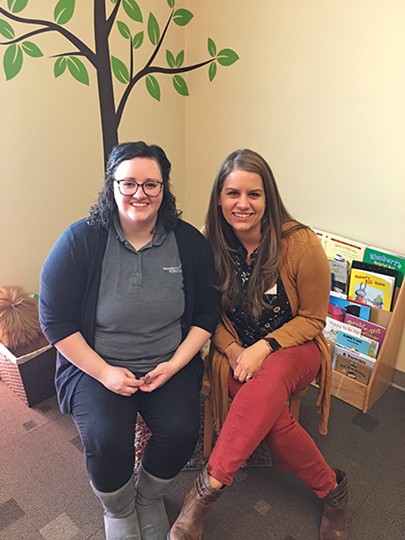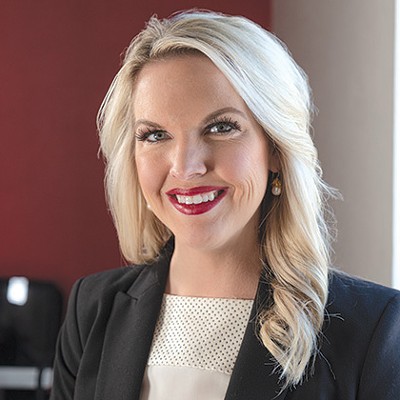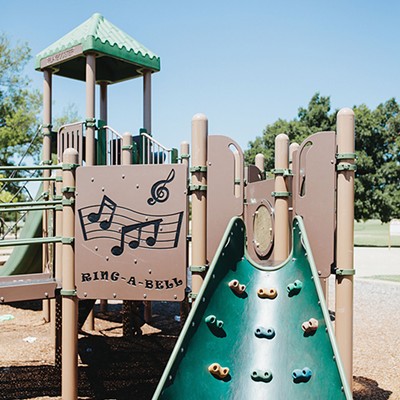
In a warm room filled with paintings, books, bean bags and puzzles, a handful of children gather around their teacher, except for one small boy whose head hangs down as he keeps painfully quiet with his back toward the group and his face buried in a corner of the wall.
Signs of a child’s distress are not always so obvious, Jordan Huffman, an Early Head Start lead teacher at Oklahoma City-based early childhood education center Educare, said. But this portrayal is an accurate example of what a toddler’s distress might look like.
“It’s very possible,” she said, “that a toddlers emotional distress can begin immediately after birth. For example, when a baby cries, a common belief is that it’s best to let the baby ‘cry it out,’ but what that actually does is teach a baby not to rely on his caregiver, that crying doesn’t work and that he might as well not ask for help at all.”
Infant early childhood mental health clinician Billie Sue Peck, who works with Huffman to address her students’ mental health needs, said a baby might also respond to a caregivers’ lack of response by crying even louder.
“He might think, ‘The only way my caregiver responds is if I cry very loud,’” she said.
Both reactions, the women said, are examples of coping mechanisms learned during infancy that carry into the toddler years and even into adulthood.
Infant and early childhood mental health coordinator Angela Fultz said the notion that it’s good to let a baby “cry it out” is one of many misconceptions society allows to fester. Another fallacy, she said, is the notion that babies don’t create lasting memories.
“They don’t develop memories the same ways adults do,” she said. “But they do develop memories and what happens during infancy doesn’t stay in infancy.”
Huffman, Peck and Fultz are employees at one of Oklahoma’s oldest nonprofit organizations, Sunbeam Family Services. In 2004, Sunbeam received a grant to administer an Early Head Start program in Oklahoma County. Early Head Start is a federally funded early childhood development program provided for children of low-income families.
In 2009, Sunbeam opened Educare, where Sunbeam’s mental health services combine with those offered by Early Head Start. The collaboration, Huffman said, is a lifesaver.
“When I’m at a loss of how to handle a distressed student, just having [Peck] come into my classroom and say, ‘We’re going to work it out together,’ is a tremendous relief,” Huffman said.
Making memories
Educare houses 16 classrooms that serve children from birth to age 5. With one teacher for every four children, there is enough room and time for a mental health specialist to visit classrooms regularly.
School curriculum, Huffman said, includes lessons specifically designed for children in the early stages of life.
An assessment is given to every child new to the program and enrolled students once a year. An “ages and stages” questionnaire gauges children on cognitive, problem solving, gross motor, fine motor and communication skills, and children are screened for emotional wellbeing during another assessment.
“We try to determine whether or not a child is able to calm themselves, if they cry for more than 30 minutes even while they are being soothed, if they smile when a caregiver is talking to them and if they are able to make eye contact,” Huffman said.
If a child demonstrates a weakness in a particular area, she said, one-on-one therapy is provided to strengthen skills.
Education is critical to children younger than age 5, Fultz said, as their minds are wired to absorb information and create a foundation for learning.
“Eighty percent of humans’ neuron connections are developed before our third birthday, and 90 percent are formed before our fifth birthday,” Fultz said.
While infants don’t have the cognitive ability to create the same kind of narrative like memories that adults do, they remember their experiences through visceral memory, or memories that involve their senses.
“That’s why our earliest memories revolve around the smell of our grandma making breakfast in the morning, the feel of grass on our feet, the sight of sparkling Christmas paper or the tone of a parent’s voice,” Fultz said.
When visceral memories are positive, Fultz said, the infant learns to trust, explore and develop properly. When they are negative, the opposite holds true: an infant can learn to distrust, be anxious and ultimately displays learning delays.
The danger of believing that infants can’t develop memories, Fultz said, is that the disbelief can result in a laissez-faire attitude about neglect, which according to data from Oklahoma’s Department of Human Services, continues to be the highest single category of child maltreatment statewide, composing 87 percent of all substantiated DHS cases in 2017.
The pressure to create positive memories on a developing mind can be intense.
“The good news,” Fultz said, “is that parents don’t have to be perfect; they just have to be good enough.”
Good enough
Being attentive to a child’s needs, engaging in conversations with them, demonstrating unconditional love for them and apologizing when mistakes are made go a long way, Peck said.
When it comes to parenting, the old saying holds true; it takes a village.
Educare is one way parents, in particular low-income families, can ensure that despite financial difficulties, their young children are forming positive experiences.
Peck said the mere act of addressing a child’s emotional wellbeing works wonders.
While she agrees that parents don’t need to be perfect, she would like to see day care programs across the state improve.
Currently, there is no state mandate that requires day care workers to receive infant mental health training or that a mental health expert advises such care workers.
“We’ve had private day cares reach out to us and say they want to mimic what goes on here,” Peck said of Educare. “I would love to see all early childhood care centers provide their employees with infant mental health care training.”
To a child who is developing memories at light speed, she said, such training makes all the difference.
Visit sunbeamfamilyservices.org.











